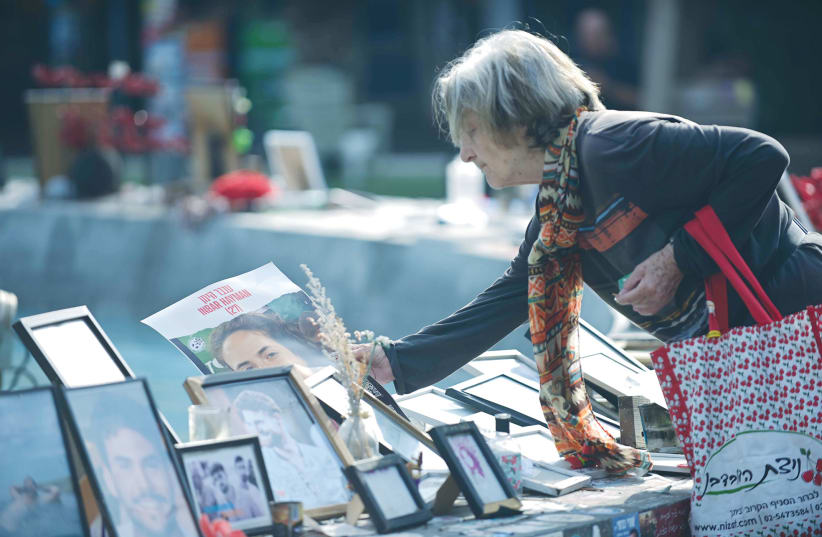In the aftermath of the October 7 attacks, many voices in the pro-Israel community took on the mantle of victimhood. They highlighted the atrocities that Palestinian terrorists perpetrated against Israelis in the South, the hostages held in Gaza, and Hamas’s refusal to own up to its horrific acts – and asked the world how they would react had they been victims of this oppression.
The strategy was well thought through. Gain the world’s sympathy and earn support for a counterattack against the Palestinian enemies that attacked Israel and held Israeli hostages.
This isn’t the first time advocates in the pro-Israel community thought that playing their victim card was a good strategy to gain global support for the world’s position. Since Israel’s pullout from the Gaza Strip in 2005, Israelis, especially those living in the Gaza border communities, have been pummeled by over 25,000 rockets. A common reaction to these rocket attacks has been to challenge the world by asking, “How would you demand your government respond if it was facing rocket fire from a neighboring enemy?” That challenge played to the same strategy: Direct the world to empathize with the Israeli position and support Israeli counterattacks.
This strategy has rarely proved effective. The world has trouble viewing Israel as the victim.
Why Israel can't be seen as the victim
Philip Slater, former professor and chair of Brandeis Sociology Department, wrote to Israelis, “You don’t get to act like a victim anymore. ‘Poor little Israel’ just sounds silly when you’re the dominant power in the Middle East. When you’ve invaded several of your neighbors, bombed and defeated them in combat, occupied their land, and taken their homes away from them, it’s time to stop acting oppressed.
“Yes, Arab states deny your right to exist, threaten to drive you into the sea, and all the rest of their futile, helpless rhetoric. The fact is, you have the upper hand and they don’t. You have sophisticated arms and they don’t. You have nuclear weapons and they don’t. So stop pretending to be pathetic. It doesn’t play well in Peoria.”
Along similar lines, in the wake of October 7, Andrew Mitrovica, a columnist for Al Jazeera, offered a much more insidious perspective on why Israel is no longer the victim: “Many of the reporters and columnists now gripped by the latest eruption of murderous madness in Palestine and Israel have always interpreted events through a prism chiefly dictated by Israel – whether they are prepared to admit it or not.
“In this myopic calculus, Israel is always the victim, never the perpetrator. Israel’s understanding of history matters; Palestinians’ reading not only of the past but of the present and the future too, does not count. And, perhaps most indecent of all, Israeli lives and deaths matter; Palestinian lives and deaths don’t.. Israel’s deliberate, organized oppression is not only unsustainable, it disfigures both the oppressor and the oppressed. Ultimately, violence begets violence in round after round of horrific vengeance by both sides.”
SLATER AND MITROVICA took anti-Zionist positions in their approach to opposing the “Israel as a victim” narrative. There is a Zionist narrative that also views victimhood as the opposite of Zionism. Andres Spokoiny, president and CEO of the Jewish Funders Network wrote, “One of the key messages of Zionism is that Jews are not going to cry over the persecution they suffered but take their destiny into their own hands. To the despair of the victim, they’d offer the hope that comes from taking responsibility and recovering agency. Not in vain were two of the first Zionist colonies named Mikve Israel (The Hope of Israel) and Petah Tikva (The Gates of Hope) and the Zionist anthem “Hatikvah” (The Hope).
Physician and early Zionist Leon Pinsker (1821-1891) began his book, Auto-Emancipation, with a quote from Hillel the Elder: “If I’m not for myself who will be, and if not now, when?” And that became the war cry of Zionism, the antidote against the poisonous drops of despair that the world kept feeding us.”
Israel can defend itself from any enemy it faces, making it far from a victim.
In his first address as prime minister, Yair Lapid declared, “We believe we must always preserve our military might. Without it, there’s no security... We will defend ourselves, by ourselves. We will make sure we always have the Israel Defense Forces, an army with undeniable strength, that our enemies fear... I stand before you at this moment and say to everyone seeking our demise, from Gaza to Tehran, from the shores of Lebanon to Syria: don’t test us. Israel knows how to use its strength against every threat, against every enemy.”
Early Zionists saw their mission as creating a state of existence for the Jewish people which would prevent them from becoming victims again. They aimed to create a Jewish state in Eretz Yisrael with its own army to protect its people. That mission took on a sense of urgency with the rise of Adolf Hitler’s Nazis in Germany. In the space of just a few short years, 10 million Jews desperately needed a place of refuge.
ON OCTOBER 7, Palestinian terrorists from a diverse group of extremist organizations streamed across Israel’s border from Gaza murdering, kidnapping, torturing, and raping.. Almost overnight it seemed the Jewish people were victims once again. Many pro-Israel voices asked the world how they would respond to such an attack, an approach seemed especially effective with America’s growing progressive movement and its premium on victimhood. The battle in the mainstream and on social media became who could portray themselves as the bigger victim. Initially, it seemed that was Israel, and for a short period it gained the world’s sympathy and support for counterattacks, especially in order to rescue the kidnapped hostages. But as October 7 receded and Israel’s actions in Gaza became more and more effective, many across the world began seeing Israel as the oppressor, its support began to wane, and even the United States, its greatest supporter, began questioning the proportionality of the attacks.
Ultimately, Zionists don’t need to play the victim card; Zionists need to explain that they are exercising their right to defend themselves and to put an end to the threats Israel faces.
The writer, a Zionist educator at institutions around the world, recently published a new book, Zionism Today.

